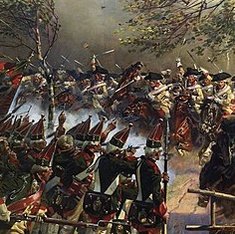Featured Quizzes
User Quizzes
Create Quiz
Data and Charts
Badges and Games
About JetPunk
JetPunk Shop
Dark Mode

Seven Years War: True or False
Are these statements about certain events of the Seven Years War in Europe (1756-1763) true or false?
Difficulty: Average, depending on your own knowledge.
Rate:
Last updated: July 20, 2020
You have not attempted this quiz yet.
More quiz info >>
| First submitted | July 20, 2020 |
| Times taken | 44 |
| Average score | 60.0% | Report this quiz | Report |
3:20
The quiz is paused. You have remaining.
Scoring
You scored / = %
This beats or equals
% of test takers
also scored 100%
The average score is
Your high score is
Your fastest time is
Keep scrolling down for answers and more stats ...
1.
The war in Europe began with a Prussian attack on Austrian Bohemia.
True
✓
False
✓
The Prussian's first made an offensive against the Electorate of Saxony, an Austrian ally.
2.
France did not focus on the war in the colonies.
True
✓
False
✓
The superior British Royal Navy made it too difficult to provide the necessary assistance to French colonies.
3.
The Dutch Republic sided with Great Britain and Prussia in an attempt to seize the Austrian Netherlands.
True
✓
False
✓
The Dutch maintained a strict policy of neutrality, refusing to aid either side.
4.
Britain was reluctant to commit troops to the European continent from 1756 to 1757.
True
✓
False
✓
Britain wished to fight primarily overseas against the French.
5.
The Electorate of Hanover fought on the side of Britain and Prussia because its Elector was also King of Great Britain.
True
✓
False
✓
George II was born in Hanover and wished to protect what he saw as his home country.
6.
The Habsburg Monarchy's primary war goal was to retake the province of Silesia from Prussia.
True
✓
False
✓
Silesia had been seized by Prussia in the War of the Austrian Succession (1740-1748).
7.
Frederick II (the Great) won his most decisive victory at the Battle of Leuthen in 1757.
True
✓
False
✓
Frederick defeated an Austrian Army of 66,000 with an army of 33,000.
8.
The traditional rivals of Austria and France allied against Prussia in what became known as 'The Diplomatic Revolution'.
True
✓
False
✓
Austria's former alliance with Britain had broken down, and so looked for new allies against an increasingly powerful Prussia.
9.
The Russian Empire was unable to conquer East Prussia.
True
✓
False
✓
After the Battle of Gross-Jägersdorf in 1757, Russia overran the province the following year.
10.
The Kingdom of Sweden remained a neutral power during the war.
True
✓
False
✓
Sweden declared war on Prussia in 1757 in an attempt to reclaim territories in Pomerania it had lost in previous conflicts.
11.
Six British infantry regiments won military honours at the Battle of Minden after defeating a French cavalry charge head on in line formation.
True
✓
False
✓
The Battle of Minden (1759) prevented the French from conquering Hanover, and potentially changed the course of the war.
12.
Winston Churchill and other historians have labeled the Seven Years War as the true 'first world war'.
True
✓
False
✓
The conflict spanned across the globe, and had world changing effects.
13.
Russia maintained its political and military stance throughout the war.
True
✓
False
✓
After the death of Empress Elizabeth and the accession of Tsar Peter III, Russia switched sides, potentially saving Prussia from certain collapse.
14.
The war took two treaties to end. The Treaty of Hamburg (1762) and the Treaty of Hubertusburg (1763).
True
✓
False
✓
It took a total of four treaties. As well as the above two, the Treaty of St Petersburg (1762) and the Treaty of Paris (1763).
15.
It can be argued the war led to both the American and French Revolutions, and consequently the rise of Napoleon and Prussia.
True
✓
False
✓
The war left the American colonies divided and France on the path to bankruptcy.
Comments
No comments yet
New and Popular
Save Your Progress
Copyright H Brothers Inc, 2008–2024
Contact Us | Go To Top | View Mobile Site
